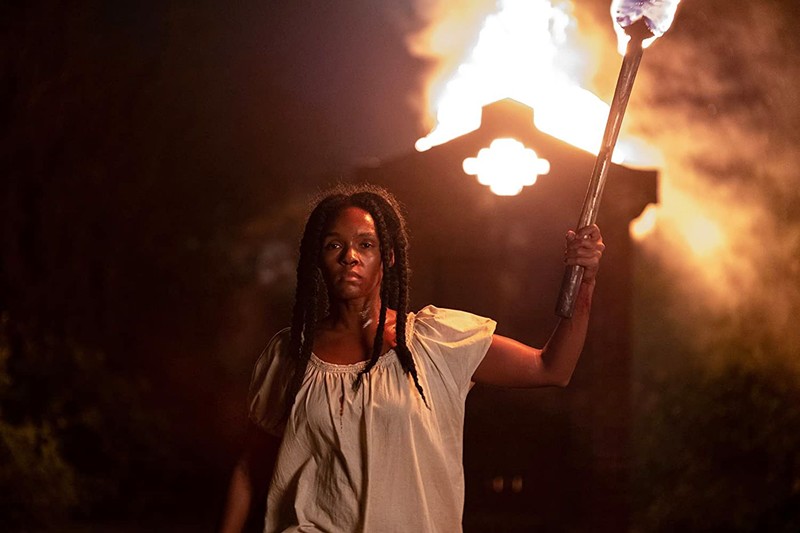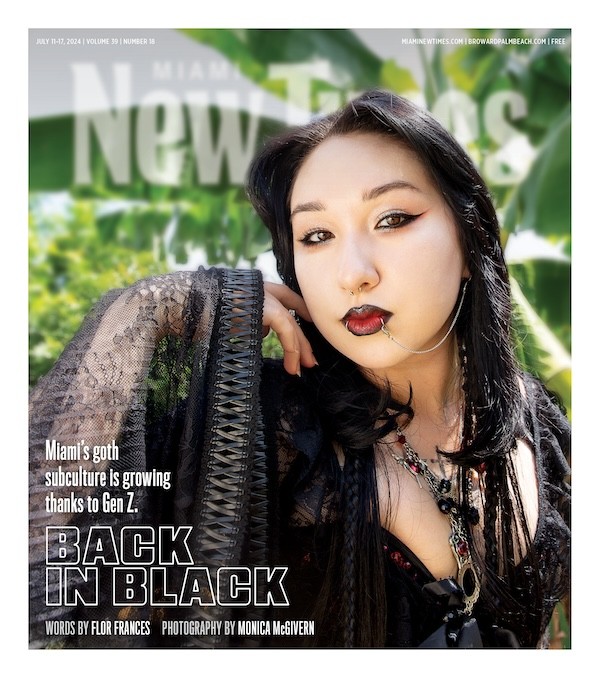I quit slavery films long ago. Being subjected to extended scenes of torture, murder, and rape of Black people doesn't appeal to me. Without fail, cameras linger too long on the misery and degradation, veering from a retelling to abject, sadistic voyeurism.
Despite the good intentions of writers/directors Gerard Bush and Christopher Renz, Antebellum is no different.
The opening scene could easily be a metaphor for the film itself — everything looks good on the surface but stay with it, and you'll see that it is a hot, muddled mess. In a sweeping one-shot, we float through an expansive Louisiana plantation. A white girl in yellow dress skips toward the Big House as the mistress (Jena Malone) descends the exterior stairs in a dress fitting of a Southern belle. Confederate soldiers traverse the grounds. The camera loosely follows the soldiers as they pass slaves at work — hanging laundry, pitching a tent — until we reach the dreary slave quarters, where captured slave Eden (Janelle Monáe) is pulled from a horse.
Here, in the shadows of a meticulously varnished façade, we find the real horror. A Black slave couple struggles under duress. The man is in an iron collar, and the woman is beset with grief as she tries to reach him. Confederate soldiers keep them apart. What follows is a slow-motion murder that results in a Black body being roped and dragged behind a horse.
Who in their right mind thought we needed onscreen racial terror right now? Who thought we needed this at all?
The film, like the plantation, has all the romanticized veneer, but behind the curtain is hasty world-building. The cinematography and overall production value are decadent. The opening score is overwrought with strings signaling impending doom. All this gloss does not make up for Antebellum's missteps. If Bush and Renz spent as much time on character and story development as they do on carefully crafted Confederate-era reenactments, wardrobe, and panoramic landscapes, this might be a better movie.
Eden, of course, must be punished for trying to run away. That punishment drags on in what could be a scene from an awful torture flick that you would pay-per-minute to watch online, and therein lies the problem. The better part of this film could be lifted out of a blueprint for the world the Klan wants to build. The violence meted out to Black people is salacious and relentless. The directors invite the viewer to be complicit in this violence. It feels dirty, punitive, and embarrassing.
At best, Monáe's performance is capable. I like capable actresses just fine, but I'd much rather see them in supporting roles. Monáe has leveled up a smidge from past performances — but only a smidge. Still, I can't hate on her for striving.The strong Black lead spends the better part of the movie being beaten, belittled, and traumatized.
tweet this
In a time jump, we meet Dr. Veronica Henley (also Monáe), a Black race theory expert with degrees from Spelman College and Columbia. She makes appearances on national news shows as the "articulate" Black scholar dispelling untruths about race in America. She headlines live talks where Black audiences jump to their feet to cheer her on. Her Washington, D.C., house is bougie AF, and her family is damn near perfect. Her husband makes pancakes and gets their daughter ready for school while Veronica watches herself on a national news show. Yet, Veronica's boss achievements do not shield her from the same insidious racism that Eden experiences.
Bush and Renz would have us believe that this film is about a black heroine who is smart and determined — a superwoman of sorts fighting for liberation, despite all odds. Ironically, the bulk of the narrative savors the subjugation of the Black heroine. Whatever the anticipated payoff, it cannot possibly counter the harm done. Black people are burned, hanged, stabbed, kicked, pistol-whipped, chastised, silenced, kidnapped, deprived, raped, emotionally tormented, and branded.
I wonder who this movie is supposed to serve? The American longing for the trappings of the antebellum South is not new to black folks. Veronica Henley is no safer than Eden in America — because racism, duh. Black folks are well aware. We see and live this every day. We're obviously not the audience — we're not even considered — but somehow, this film is supposed to move the conversation around forward?
That's a bald-faced lie.
There are so many good narratives written by Black folks about Black struggles that do not make it to the screen, but every year, some tepid slave film does. I'm sure Bush and Renz think their work casts new light on a cruel American institution. On the contrary, Antebellum serves up all the standard slavery fare, and the strong Black lead spends the better part of the movie being beaten, belittled, and traumatized. Spare yourself.
Antebellum. Starring Janelle Monáe, Tongayi Chirisa, Eric Lange, Jena Malone, and Jack Huston. Written and directed by Gerard Bush and Christopher Renz. Rated R. 105 minutes. Streaming now on-demand.












